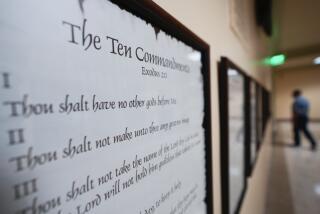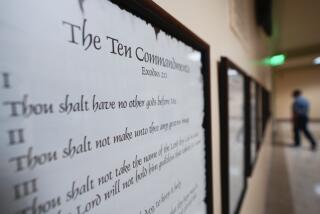In Louisiana, a fight to end a Jim Crow-era jury law is on the ballot
- Share via
Reporting from New Orleans — When Glenn Davis was 19, he was convicted of second-degree murder and sentenced to life in prison without the possibility of parole — even though the jury deciding his fate did not agree on his guilt.
Because of a Jim Crow-era statute, a person in Louisiana could be convicted of a felony and sentenced to prison, including life without parole, on a 10-2 or 11-1 verdict.
“My life was in the hands of a treacherous system that would convict me, even though two of the jurors said, ‘Not guilty,’” Davis, now 45, said in a recent interview. “How can you say a person has been convicted beyond a reasonable doubt if one juror says, ‘Hold up. Wait! Something’s not right about this’?”
Across the United States, federal courts and 48 states require juries to be unanimous in felony verdicts. Louisiana is the only state to allow nonunanimous verdicts in murder trials. Only one other state, Oregon, allows split-jury verdicts in felony cases.
Lawmakers in Louisiana passed the split-jury rule in 1880 after the 14th Amendment guaranteed all men, including former slaves, the right to vote and serve on juries. The rule was formally entered into the Louisiana Constitution at the state’s 1898 constitutional convention, where lawmakers declared a mission to “perpetuate the supremacy ofthe Anglo-Saxon race in Louisiana.”
Over the last decade, Louisiana activists and attorneys have filed more than 20 petitions to the U.S. Supreme Court challenging the rule on behalf of inmates of the Louisiana State Penitentiary, known as Angola. Those efforts have been unsuccessful, but the law could soon be overturned as Louisiana legislators, in a rare bipartisan move, passed a bill in May calling for a referendum.
On Nov. 6, Louisiana residents will be able to vote to amend the state constitution and require future juries to return unanimous verdicts for convictions in felony cases.
Advocates for changing the law say the split-verdict rule has long ensured that Louisiana is one of the prison capitals of the world, and that the law has a disproportionate impact on minority defendants and jurors.
In a review of nearly 1,000 Louisiana felony trials from 2011 to 2016, the Advocate, a newspaper based in Baton Rouge, found that about 40% of convictions by 12-member juries had one or two holdout jurors. Black defendants in such cases were about 30% more likely to be convicted than white defendants.
In Davis’ case, there were good reasons for jurors to be circumspect about his guilt.
A black teenager charged with second-degree murder in a drive-by shooting in the New Orleans suburb of Westwego, Davis was locked up on the basis of testimony from a single eyewitness — a man with a history of drug abuse and a long criminal record.
The jury, Davis said, was initially deadlocked along racial lines, with nine white jurors voting guilty and three black jurors voting not guilty. But after the judge instructed them to deliberate further and come back with a verdict, he said, the majority swayed one juror. Still, two others continued to doubt his guilt.
Davis’ conviction was eventually overturned after Innocence Project New Orleans found the state had hidden evidence that linked another man to the crime and suggested the supposed eyewitness was nowhere near the crime scene.
After serving 14 years and nine months in prison, Davis was released in 2007. He was exonerated in 2010.
“The system determined I be sent to prison for something I didn’t do,” said Davis, a truck driver and construction worker in Avondale. “My ancestors had to go through slavery, being considered three-fifths of a human being and being hung from trees and lynched right here in Louisiana. This was just a legal way, a modernized way, to continue to do the lynching, I guess.”
According to Innocence Project New Orleans, in the last 30 years split juries were involved in at least 43% of Louisiana’s exoneration cases in which a nonunanimous jury verdict was an option.
The campaign to require unanimous juries is the latest in a series of significant steps to reform criminal justice in this conservative Southern state.
This year, Oklahoma unseated Louisiana as the state with the nation’s highest incarceration rate after Louisiana lawmakers passed a landmark package of criminal justice reforms. The new laws aim to steer people convicted of less serious crimes away from prison and cut jail sentences for those who can be safely supervised in the community.
“This could change the game in a way that mass incarceration as we know it today probably won’t even exist five years from now in this state,” said Norris Henderson, a former Angola inmate who is state director of the Unanimous Jury Coalition and executive director of Voice of the Experienced, a New Orleans grass-roots group.
Ahead of the referendum, an unlikely coalition of former inmates, civil rights activists, Republican lawyers and Christian conservatives is canvassing, phone-banking, writing blog posts and running TV ads in a bid to educate voters and urge them to overturn the law.
“It is time for Louisiana to rejoin the rest of the nation,” said Ed Tarpley, an attorney in Alexandria who is a former prosecutor and a Republican. He quoted founding father John Adams: “It’s the unanimity of the jury that preserves the rights of mankind.”
When Louisiana became a U.S. territory in 1803, it required unanimous jury verdicts.
Part of the impetus for the split-jury rule was a desire for quick convictions in the years after Reconstruction. Nonunanimous juries ensured African American jurors could not use their voting power to block convictions of other African Americans, thus providing free prisoner labor as a replacement for the loss of free slave labor, said Thomas Aiello, associate professor of history and African American studies at Valdosta State University in Georgia.
“Since the 13th Amendment says you can’t have slaves and put people in bondage unless they are convicted of a crime, the white South just started saying ‘Well, we’d better start convicting people of crimes,’” said Aiello, author of “Jim Crow’s Last Stand: Nonunanimous Criminal Jury Verdicts in Louisiana.”
Unlike more rural places where it was easier to keep potential black jurors off the jury rolls because they were already disenfranchised, Louisiana had a large city, New Orleans, with a long-standing free black population.
“The idea was instead of kicking off all of the black jurors, just making black jury service impossible, we can keep the federal government off our back if we continue to let black jurors serve,” Aiello said. “But since there will only be one or two of them on the jury, their votes won’t actually matter.”
Decades later, Oregon’s nonunanimous jury law, for felony cases other than first-degree murder, was also born out of racial tension. In 1934, Oregon voters passed a measure allowing for a 10-2 jury split after a sensational murder trial in which a Jewish man accused of executing a man and a woman was spared the death sentence because of a lone holdout juror.
Attempts to get the U.S. Supreme Court to overturn nonunanimous jury laws have been unsuccessful. In 1972, the nation’s highest court ruled that there was no constitutional right to a unanimous verdict and that Oregon’s law did not violate due process. Later that year, it found that Louisiana’s nonunanimous verdict did not violate the “reasonable doubt” standard embodied in the 14th Amendment.
This year, some Louisiana lawmakers who voted against the referendum said that requiring unanimous juries may lead to more hung juries and costly retrials.
Louisiana Atty. Gen. Jeff Landry has indicated that he opposes any overhaul of the jury system on the basis that 10-2 jury systems are more efficient. But the Louisiana District Attorneys Assn. has taken a neutral position on the issue, and no group appears to be working publicly to keep the nonunanimous system in place.
The biggest challenge is educating people about the law, said Calvin Duncan, a former Angola inmate who is a project director at the Promise of Justice Initiative, a nonprofit that advocates for criminal justice reform.
“People have to know this is not about being soft on crime or making it easy for the defendant to work the system,” Duncan said. “It’s about a fundamental right that everyone should have, no matter where you are in the United States. The mere fact that it was introduced to preserve white supremacy should be enough.”
Many residents interviewed in downtown New Orleans recently said they were not sure how they would vote.
“I see both sides,” said Saban Sellers, 25, an administrator for a commercial real estate firm in New Orleans, noting that 10-2 is a majority. “If 10 jurors agree, and just two think differently, how many times can you retry? On the other hand, if everyone is seeing all the facts and two people actually think he didn’t do it, then maybe he is innocent?”
Davis said he has struggled over the last 11 years to transition back into society. He hopes voters will overturn the law to require unanimous juries, forcing prosecutors to work harder to prove defendants’ guilt and persuade all 12 jurors to convict.
He said he would not want anyone “else to go through what I had to go through.”
Twitter: @jennyjarvie
More to Read
Sign up for Essential California
The most important California stories and recommendations in your inbox every morning.
You may occasionally receive promotional content from the Los Angeles Times.











